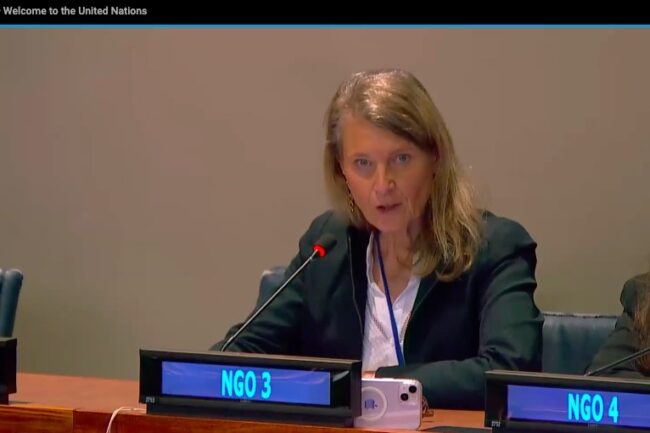Investing in mothers key for inter-generational change
13.02.24
UN New York, CSocD62 - MMM's intervention to the Commission on Social Development reiterates that investing in mothers through recognition, education, protection and adequate support is a smart investment, with positive ripple effects on children, families, communities and ultimately society as a whole.

The following is the full text of our oral statement to the 62nd session of the UN Commission on Social Development, which was delivered on 12 February 2024 by Marie Delecourt, MMM Representative to the UN in New York.
We believe that investing in mothers is key to fostering social development and social justice, and more generally to realise the SDGs.
Everyone has a mother. And yet, a survey recently conducted in the US and the UK shows that a startling 95% of mothers feel unappreciated, unacknowledged or invisible — and 98 % believe that this “invisibility” severely impacts women’s health.
In addition, motherhood has economic and social costs. All over the world, women do the vast majority of the unpaid work of caring for children and other household members, a work which, although indispensable, remains unnoticed, unrecognized, and undervalued.
Women who are mothers also suffer from specific discriminations induced by cultural stereotypes, biases in perception and social expectations. The so-called ‘motherhood penalty’ hinders their access to formal work, career advancement and perpetuates wage and pension gaps.
In other words, mothers endure social and economic injustice – a situation that can and should be addressed.
But there is more to it: when resources, laws and policies are directed towards empowering mothers, the benefits are manifold, and have a ripple effect on children, fathers, families, communities and society as a whole.
At Make Mother Matter, we believe that more research is needed to get a full picture of this invisible economic activity happening within households and to evaluate the return on investment by focusing more on mothers. To give an example, a (2014) study by the London School of Economics shows that the costs of perinatal mental health problems to society is 5 times more than the cost of improving maternal mental health services.
Investing in mothers in particular, addresses the feminization of poverty and the inequitable distribution of unpaid care and domestic work that underpins it. It means recognizing that unpaid domestic and care work is work, valuable work, which sustains the economy and society, benefitting everyone.
Investing in mothers also means equipping mothers with the right tools and support to help them fulfil both their caregiving responsibilities and their roles in the civic and economic spheres. This includes: ensuring that every mother benefits from professional training; social protection and health access– including full maternity protection; access to education – including parenting education; mental health services – including childcare services.
By doing so, we not only uplift the mothers themselves but also set in motion a positive cycle of inter-generational change.
We therefore call on member States to mobilize resources to recognize and invest in mothers – a smart investment, and a necessary step to move to a much-needed caring society and economy.
The 62nd UN Commission on Social Development took place 5-14 February 2024 at the UN headquarters in New York with the priority theme: ‘Fostering social development and social justice through social policies to accelerate progress on the implementation of the 2030 Agenda for Sustainable Development and to achieve the overarching goal of poverty eradication’.
The recording of the meeting is available on UN Web TV (MMM’s statement starts at 01:54:46).
→ See also MMM written statement to the Commission on Investing in mothers to foster social development, social justice and eradicate poverty.
The New EU Gender Equality Roadmap : A Call for Inclusion of Mothers
04.03.25
The European Commission’s initiative on a new Gender Equality Roadmap post-2025, marks a significant step forward in addressing gender disparities across the European Union. Make Mothers Matter (MMM
Breaking the Cycle: Gender Equality as a Path to Better Mental Health
18.03.25
The Council of the European Union has taken a decisive step in recognising the vital connection between gender equality and mental health.
Europe Must Listen to Mothers: Our landmark report heads to the European Parliament
28.08.25
On 22 September 2025, the voices of mothers will take centre stage in Brussels. For the first time, Make Mothers Matter (MMM) will present its State of Motherhood in Europe








